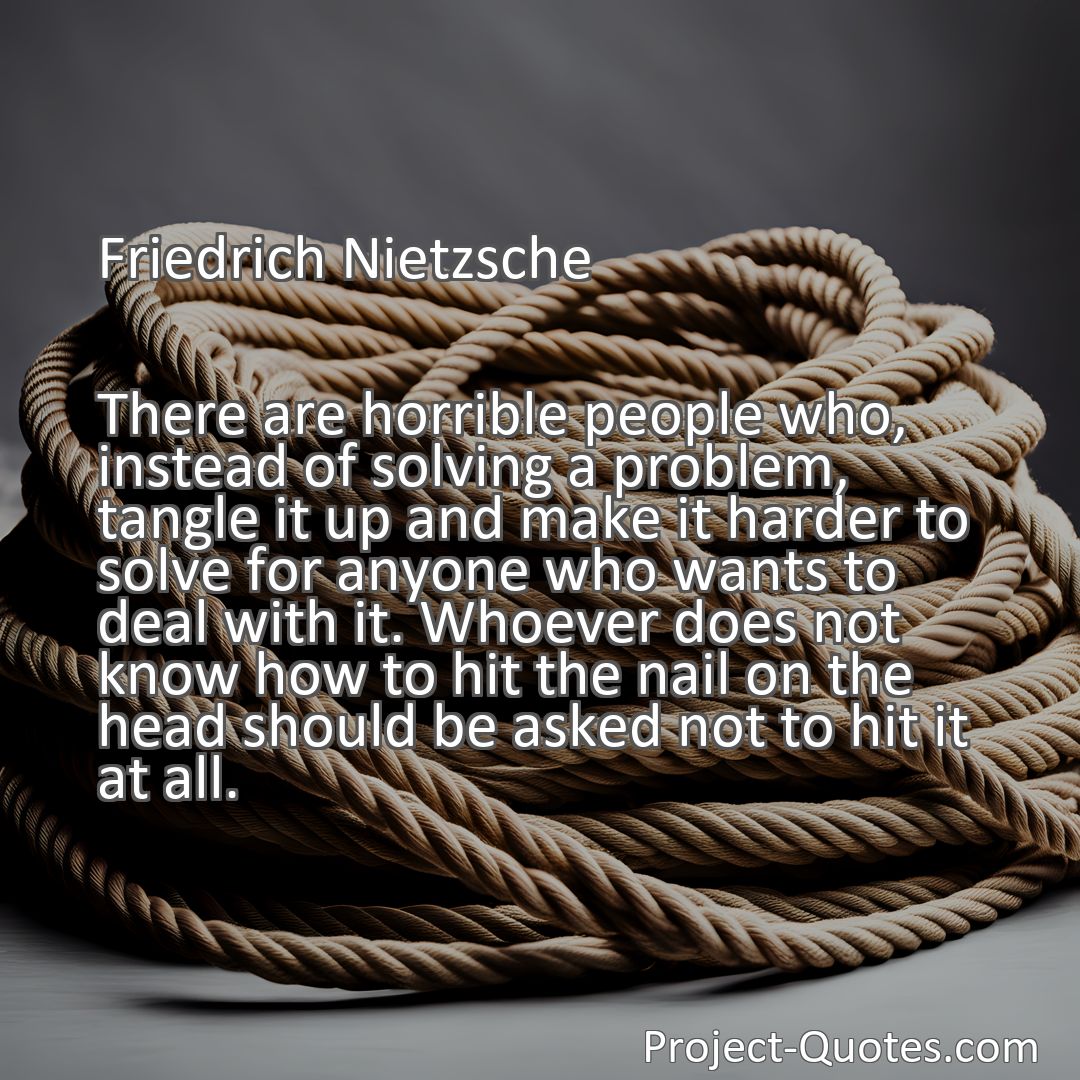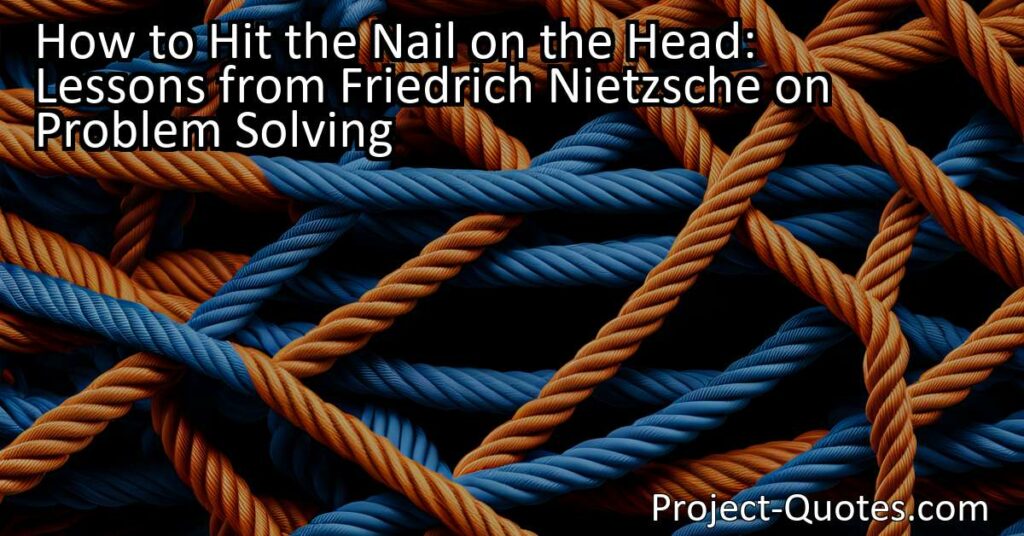There are horrible people who, instead of solving a problem, tangle it up and make it harder to solve for anyone who wants to deal with it. Whoever does not know how to hit the nail on the head should be asked not to hit it at all.
Friedrich Nietzsche
How to Hit the Nail on the Head: Lessons from Friedrich Nietzsche on Problem Solving Friedrich Nietzsche’s quote teaches us the importance of understanding problems before trying to solve them. Rushing into solutions without careful thought can make things worse. Patience, gathering information, and knowing when to seek help are key lessons in problem-solving.
Table of Contents
- 1 There are horrible people who, instead of solving a problem, tangle it up and make it harder to solve for anyone who wants to deal with it. Whoever does not know how to hit the nail on the head should be asked not to hit it at all.
- 2 Friedrich Nietzsche
- 3 Meaning of Quote – There are horrible people who, instead of solving a problem, tangle it up and make it harder to solve for anyone who wants to deal with it. Whoever does not know how to hit the nail on the head should be asked not to hit it at all.
- 4 Freely Shareable Quote Image
- 5 Related
Meaning of Quote – There are horrible people who, instead of solving a problem, tangle it up and make it harder to solve for anyone who wants to deal with it. Whoever does not know how to hit the nail on the head should be asked not to hit it at all.
Have you ever been working on a really tough puzzle, only to have someone come along and mess up the pieces you’ve painstakingly put together? Or imagine you’re building a really cool tower out of blocks and someone accidentally (or maybe on purpose) bumps into it, causing your tower to tumble down. It can be super frustrating, can’t it? Now think about that happening, but with real-life problems. That’s kind of what the philosopher Friedrich Nietzsche was talking about when he said:
“There are horrible people who, instead of solving a problem, tangle it up and make it harder to solve for anyone who wants to deal with it. Whoever does not know how to hit the nail on the head should be asked not to hit it at all.”
What does it mean to hit the nail on the head? Well, it’s a phrase that means to describe exactly what is causing a problem, or to say something that is exactly right. It comes from the idea of using a hammer to hit a nail – if you hit the nail correctly, right on the head, you drive it straight into the wood, and you’re making progress in building or fixing something. But if you miss and hit the wood instead, what happens? You could bend the nail, damage the wood, or even hurt your thumb! So, basically, Nietzsche is saying it’s better not to try fixing a problem if youre just going to make everything worse.
Alright, let’s dive a bit deeper into what he meant. There are people out there who, when faced with a problem, might not think it through completely. Instead of making things better, they sometimes make assumptions or quick decisions that complicate things even more. It’s like when someone tries to help with a tangled knot. If they’re not careful and patient, they might just pull on the ends of the rope without understanding how it’s tangled, and as a result, they make the knot tighter and harder to untie.
In life, problems can be anything from a simple everyday issue, like trying to fix a bike chain, to much bigger things, like helping a friend through a tough time. When we rush into situations trying to solve things without really understanding them, we might accidentally make things more difficult and confusing. And like the tangled knot, a complicated problem needs a thoughtful and careful approach, or we won’t just fail to solve itwe might make it worse for others who will try to solve it later.
So, imagine you see a friend struggling with their homework. It might be tempting to dive in and quickly tell them what to do. But what if instead you asked questions to help them think, and you listened to their ideas first? That way, you’re not so much telling them the answer, but helping them figure it out for themselves. This can make a difference between feeling frustrated and feeling like they’ve learned something. After all, isn’t it more satisfying when you solve a tough math problem on your own, even if it takes a little help and encouragement?
Nietzsche’s quote reminds us that when we help others, we should be thoughtful about it. If we realize we’re not sure how to help, it’s okay to step back and maybe find someone else who’s better suited to solve the problem. In our bike chain example, if you don’t know how to fix it, maybe there’s a friend, a family member, or a bike shop that knows just what to do. In doing so, we’re hitting the nail on the head in a different way: by realizing our limits and finding the right person for the job.
But what about those “horrible people” Nietzsche mentioned? Well, it’s pretty harsh to call someone horrible just because they got tangled up trying to help. It might be more accurate to say that sometimes good intentions without the right skills or attention can lead to not-so-good outcomes. It’s like when someone shares a rumor about a classmate without checking if it’s true. They might not intend to cause trouble, but spreading untruths can definitely tangle things up and cause more problems.
When we encounter a problem, thinking before we act is crucial. We should gather as much information as possible and maybe even make a little plan before springing into action. It’s a little like being a detective; we gather clues, talk to people, and put together the pieces before we draw a conclusion.
Finally, Nietzsche’s words give us another important lesson: the value of patience. Rushing to solve a problem might seem like the way to get fast results, but it rarely is. Have you ever heard the saying “Haste makes waste”? It means that when we hurry too much, we might make mistakes that can cause more harm than good. Taking our time to understand a problem helps to ensure that when we do act, we’re making things better, not more complicated.
So the next time you’re faced with a problem, whether its fixing something thats broken or helping out a friend, remember Nietzsche’s words. Think it through, be patient, and seek help if needed. It’s not just about being able to hit the nail on the head; sometimes, it’s about knowing when not to pick up the hammer at all. By doing this, you’ll be a problem solver, not a problem maker, and that’s something Nietzsche would surely have thought was a step in the right direction.
I hope this quote inspired image brings you hope and peace. Share it with someone who needs it today!


